#but we should not allow our criticism of the narrative to distort our perception of canon or characters
Explore tagged Tumblr posts
Text

# The Filter Facade: Unveiling the Layers Behind Our Digital Selves
In the vibrant world of social media, filters serve as both a shield and a spotlight, crafting digital personas that often diverge from reality. A striking example from Vietnam is the famous TikToker Xuan Ca, who, like many others, faces scrutiny over her use of beautifying filters. Criticized for appearing differently in public than on her social platforms, Xuan Ca's experience echoes a global conversation: In a world awash with filters, what is the cost of our digital enhancements?
## The Allure and Illusion of AR Filters
Augmented reality filters, a technological marvel, allow us to overlay our world with a digital veneer, making the mundane magical. These filters have democratized beauty standards, allowing anyone with a smartphone to adhere to or defy these norms at the tap of a screen. However, beneath this allure lies a complex web of implications for digital communication and self-presentation.
## The Impact of Filters on Digital Culture
The role of filters extends beyond mere aesthetics; they are a metaphor and a tool within our algorithmic culture. As Rettberg (2014) points out, filters shape our perception of reality, influencing the content we consume and produce. This extends to biases in photography and social media genres, driving specific narratives and self-representations. Baker (2020) further explores this by critiquing Snapchat's beautifying filters, which while enabling creativity, also perpetuate harmful beauty standards and contribute to issues like body dysmorphia.
## A Dual-Edged Sword
The controversy surrounding figures like Xuan Ca illuminates the double-edged nature of digital filters. On one hand, they offer a means of self-expression and creativity; on the other, they are criticized for fostering unrealistic beauty ideals and distorting self-perception. This dichotomy raises essential questions about our engagement with digital technologies and the societal norms they propagate.
### Critical Reflections on Filter Use
Analyzing filters through the works of Rettberg and Baker offers a comprehensive view of their impact on modern digital culture. Their research underscores the importance of critical engagement with the technologies we use daily, urging users to reflect on the implications of their digital personas. As filters continue to evolve, navigating their benefits and drawbacks becomes increasingly crucial, particularly for younger audiences who are more susceptible to their influence.
## To Filter or Not to Filter?
The debate surrounding the use of filters, exemplified by the criticism of public figures like Xuan Ca, prompts a broader reflection on our digital practices. Should the quest for digital enhancement overshadow authentic self-representation, or can we find a balance that respects both individual expression and reality?
## Conclusion
As we delve deeper into the filtered world of social media, the conversations around digital identities, beauty standards, and self-perception become more pressing. Filters, in their many forms, shape not only how we see ourselves but also how we are seen by others. Engaging critically with these digital tools, understanding their impact, and fostering a dialogue about their use can help navigate the complex landscape of digital culture with greater awareness and authenticity.
references:
Barker, J. (2020). Making-up on mobile: The pretty filters and ugly implications of Snapchat. Fashion, Style & Popular Culture, 7(2), 207–221. https://doi.org/10.1386/fspc_00015_1
Rettberg, J. W. (2014). Filtered Reality. Seeing Ourselves through Technology, 20–32. https://doi.org/10.1057/9781137476661_2
0 notes
Text
Star Trek: The Characters
Storytelling, especially where it regards movies and television, is always evolving.
Whether it’s in deeper themes, better effects, different genres, or evolving archetypes, there is always something that is changing, except, perhaps, where the importance of characters are concerned.
Characters are an integral part of storytelling, particularly where it concerns television. When it comes to television, the setup is everything, and the characters are part of that setup, that ‘home base’ that the audience returns to at the start of every episode. The characters are the people that the audience gets to know, who star in each adventure. Characters are what holds the audience’s investment, the reason fanbases tolerate bad episodes and praise good ones. In the end, the main characters keep an audience’s attention, making each episode, even the bad ones, enjoyable.
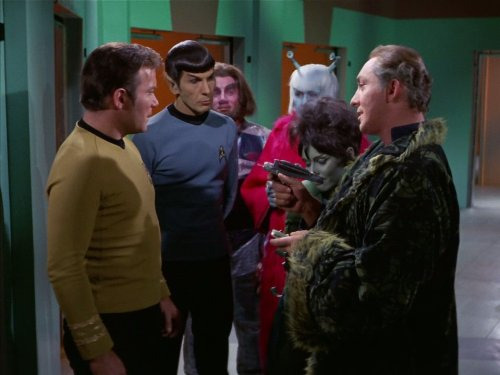
In short, characters can make or break a television show. It is vital that they be likable, or at the very least, interesting, lest the audience utter those eight deadly words:
I Don’t Care What Happens To These People.
Once those words are uttered, it doesn’t matter how gripping your narratives are. The viewers will start to leave.
See, while a film can get away with some lesser characters by distracting with an interesting concept, set-piece or a fast-paced story, television can’t. Thanks to a smaller runtime and a smaller budget, television, by necessity, tends to be character based. As a result, the main cast of a television show has to be able to work in multiple stories of different kinds.
This means that writing for characters on television can be pretty difficult.
The best television characters tend to merge two ideas together: That of relatability and entertainment value.
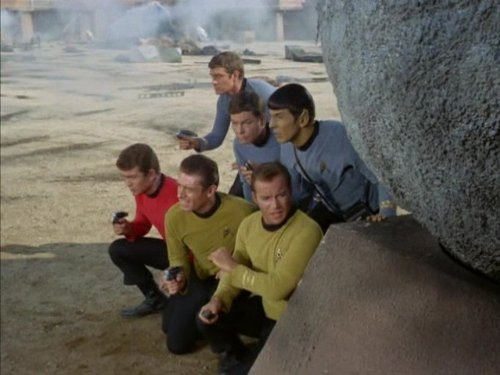
You see, television, like all stories, tells stories of exaggerated versions of reality, especially in the cases of science-fiction adventure shows like Star Trek. The only way to make an audience buy an unbelievable world is to create believable characters to place in that world, that relatability in the stories and characters. When we see McCoy’s frustration, or Kirk’s boldness, or Spock’s reservedness, we see elements of ourselves, our own personalities and lives. It is vital to make characters seem real, if not realistic.
The question is, does Star Trek manage to do that?
That’s the question we’re going to be answering today. Let’s take a look, starting with the Captain of the Enterprise Crew: James Tiberius Kirk.

Kirk truly was The Captain in every sense of the word. A Reasonable Authority Figure who did far more adventuring than realistic counterparts would have, Kirk was an Action Man, level-headed, dutiful, and always loyal to his ship and his crew. A Bold Explorer (it’s in the job description), Kirk, while not fearless per say, took the Chains of Commanding quite seriously, and would often face down hugely powerful beings, power-mad computers, or other forces beyond him in order to save his crew. A Determinator to the last, known for his interesting ways to think outside the box and refusal to accept a ‘no win scenario’, he is the unquestionable Hero of the show, the Leader, who often throws the rules aside to do what he feels is right, in a constant battle To Be Lawful or Good. He was a Charmer, an expert fast-talker, and very smart. In later installations of the franchise, Kirk would become a Living Legend, much as he became in our own pop culture.
All that being said, the common cultural image of Captain Kirk isn’t quite right. Allow me to adjust it, as best I can.
More than any other character in Star Trek, or perhaps the history of television in general, Captain Kirk is possibly the most misrepresented character of all time. Since the ‘60s, Kirk has evolved into an icon of heroism, machismo, and brash boldness, with even the recent Star Trek reboot depicting, not Kirk, but rather, the distorted, separate idea of Kirk in the modern light.

This idea, quite frankly, is just not right. While Kirk did have his share of romances, he was no womanizer, often entering into dubiously consented-to relationships reluctantly, in order to save the ship. The relationships he did actively pursue, he threw himself into wholeheartedly, and he was just as crushed as the other party every time they fell apart (for proof, watch City on the Edge of Forever or The Paradise Syndrome). Kirk was no player. As a matter of fact, he was a deeply compassionate man who respected the women in his life as much as he respected Spock and McCoy. It just so happened that the women in his life tended to not stick around, unlike his one true love: The Enterprise.
Even his reputation of the ‘Cowboy Captain’ isn’t accurate. As I mentioned before, Kirk was defined by compassion. His moments of ‘rule-breaking’ wasn’t to impose ‘the way he thinks things should be’, it’s because Kirk cannot bear to watch helpless people in trouble. The few times where he does break the famous ‘Prime Directive’ (To not interfere with less developed races) is to help. Kirk was a deeply moral character, determined to not stand by while people were taken advantage of. He wasn’t rash, either. While it may be accurate to say that the ship’s doctor, Leonard McCoy, was a bit on the hot-headed side, it is entirely inaccurate to accuse Kirk of the same. Kirk was an extremely smart man, a level-headed captain who was an expert at thinking fast. He trusted his instincts, but he trusted his advisors too, often finding a balance between McCoy’s impulsiveness and Spock’s cold rationality. Kirk’s intelligence and competence is often lost, overshadowed by his more extreme companions, and some audiences have forgotten the truth of Kirk’s character: a cunning problem-solver capable of saving the day under enormous pressure, whose decisions are far from based in irrationality. He is a romantic, duty-bound to protect his ship and crew, greatly exaggerated and mis-characterized in the years following his captaincy.
As such, Kirk was a well-rounded, balanced character, far more three-dimensional than the modern idea of him tends to give him credit for.
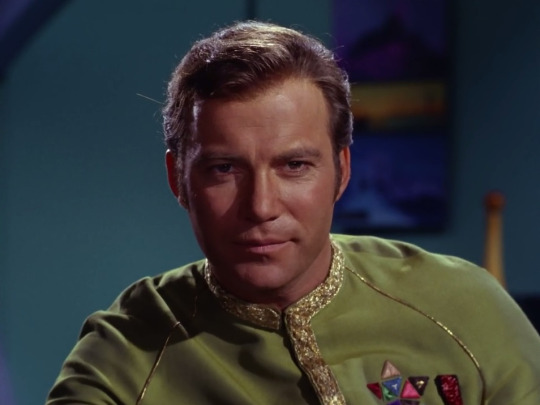
That’s all well and good, sure, but how does he fit as a main character in a television show?
As a matter of fact, absolutely incredibly.
Kirk serves as a wonderfully effective lead, compelling, entertaining, and interesting. Infinitely more developed than most leads of his time, and even more modern examples, Kirk was a game-changer, a revolutionary kind of protagonist who just worked. The perfect balance of the main trio of the series, Kirk is the perfect face for Roddenberry’s ideals: a hopeful pragmatist, an idealist who proves the best of humanity: compassion mixed with intelligence, boldness combined with understanding. A man of action surrounded by True Companions, Kirk was an extremely gripping protagonist who felt intensely, a perfect person for the audience to connect to and be invested in. He drove the stories, opposed the villains, and always saved the crew, as a hero should, but it’s important to note that Kirk was hugely human, possessing many of our greatest attributes, but some of our failings as well. He wasn’t perfect. Sometimes he made the wrong choice. In the end, though, he was us, or us as we should strive to be: always learning and helping, and always reaching for the stars.
But of course, Kirk wasn’t alone in his position as the ‘lead’ of the show. It’s doubtful the show would have survived in the popular culture as well as it did if it weren’t for his support team, his True Companions: Dr. Leonard McCoy, and, more famously: Mr. Spock.
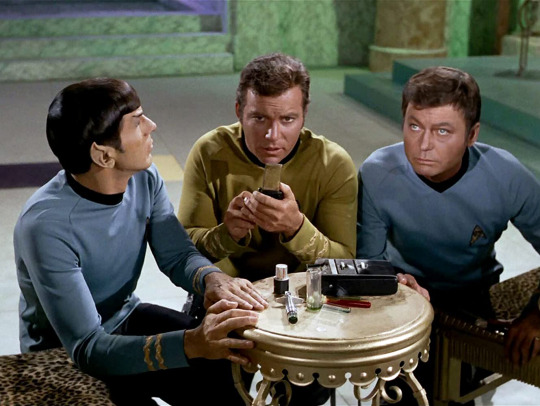
If Kirk represented the best of humanity, Spock represented the critique of it. In a previous article, I pointed out that Spock exists as a very unique character: a half alien, half human crewmember who, while equally valuable to the script and the characters as Kirk was, served a different purpose: to point out and explore humanity from the outside.
Like I’ve mentioned before, Spock is a different sort of character than Kirk is. Where Kirk is a demonstration of the best of humanity as we see it, Spock is a demonstration of humanity as someone else might. He served as a criticism of the human condition, a character at war with himself and his heritage, split between the emotional humans, and the rational Vulcans. Spock is the Number One, almost Comically Serious as he eschews his more illogical half and chooses to embrace the stoicism of the Vulcan people. A Gentleman and a Scholar, Spock has Hidden Depths, a heart of gold and deep emotions that he usually succeeds in hiding.

Most of the time. More on that in a minute.
Spock’s role in the show was The Smart Guy, the Stoic who had all the answers, all the statistics. He was the champion of impartial logic, of cold rationality. His job was to give Kirk the hard answers, to bring to him the facts and give him their options, especially the unforgiving ones. He is the cold to McCoy’s hot, a stern-faced, cold-blooded computer.
Or is he?
Much like Kirk, there is a lot more to Spock than meets the eye. While the cultural perception of Spock has often mutated into a parody of itself, much as it has done to Kirk’s reputation, Spock remains a much deeper character than he, or a brief skim of the series, lets on. As I said earlier, Spock is at war with himself, uncomfortable in his own skin. He insults humans for their humanity, but has strong, deep friendships with them. He is not above expressing frustration and their emotional natures when pushed (usually by other forces that knock his guard down), but isn’t frustration a human emotion?
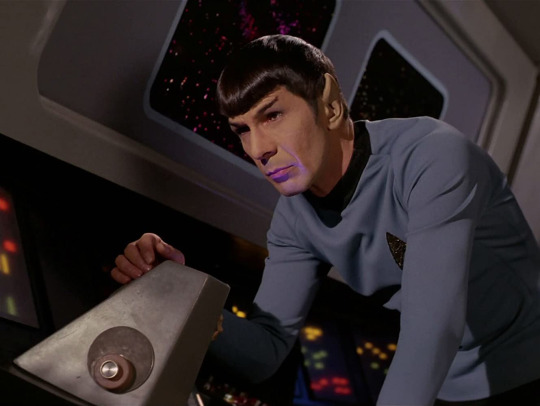
Spock is a bag of contradictions, a supposedly emotionless master of sarcasm, a man without feeling who invites his close friends (emotional humans) to a private Vulcan ceremony, a cold-blooded creature with undying loyalty who occasionally makes ‘illogical’ decisions that would make Kirk proud. A lover of music and a sympathizer to space hippies (Not one of Star Trek’s better episodes, admittedly), Spock was an outsider who fit neither fully as a Vulcan or Human, a person who was struggling to find his place in the universe.
At first, this seems incongruous with the ice-cold exterior he projects, however, rather than being an example of inconsistent writing, it’s a shining example of development and nuance.
You see, Spock never gives up his following of logic. He just begins to approach it differently.
Spock’s style changes slightly as Star Trek progresses (most notably in the films, released ten years after the show’s final season), from cold, ‘computer’ logic to something else: human logic.

One thing of especial note in the original Star Trek show is that you could see characters visibly affecting one another. Kirk, Spock and McCoy all influenced each other in the ways they thought, reacted, and planned, and worked best as a unit. In this, the humanity of the main cast affected Spock in his slow, reluctant appreciation of human merits. In time, Spock began to make one or two decisions based on human logic, intelligence and emotion. In episodes like The Menagerie or The Galileo Seven, Spock makes decisions that seem out-of-character for him, based in emotion.
Spock is, in many ways, Star Trek’s best known and favorite character. The most visibly recognizable, as well as the most distinct, Spock is given more episodes exploring him than any other character, with installments like Amok Time and Journey to Babel, (the latter of which we explore his parents, and discover why it is that Spock has such a hard time with his human half) helping to examine Spock as a character.
The end result was a beloved science fiction icon, Kirk’s right hand man, an analytical, fascinating character as well-crafted and loved as Kirk himself.
Spock and Kirk are often remembered fondly, and are typically considered the most memorable and iconic characters of the franchise, but they don’t work alone. Their dynamic is as effective as it is because of balance. Spock is one extreme, and Kirk is the middle, but it’s no good without the other extreme: Dr. Leonard Horatio “Bones” McCoy.

McCoy is all hot-blooded human, the third of the main Power Trio. An old-fashioned competent doctor who wasn’t entirely thrilled with deep space, McCoy is a deeply emotional character, duty-bound to follow his morals. He clashed with Spock regularly, routinely criticizing him for his perceived lack of emotion. Despite the fighting, McCoy respected Spock greatly, counting him as a close friend, despite their arguments and different perspectives. A cantankerous pacifist (though not above getting into the action when needed), McCoy is a Super Doc and a Sarcastic Devotee, a Grumpy Old Man who serves as the Heart to Spock’s Brain (hah!), a man who values Honor Before Reason who values the Good Old Ways. He’s a Determined Doctor who does everything he can for his patients, and a Deadpan Snarker to the point where he can match Spock in verbal sparring.
Bones represents the unpolished rawness of humanity, getting carried away with his emotions sometimes, but always with the best intentions. Another Jerk with a Heart of Gold, McCoy’s gruff nature accompanied a deeply moral man, very concerned with human empathy and doing the right thing. No philosophical discussion was complete without McCoy’s two cents, telling Kirk what he thought the right thing to do was. He was the quintessential Knight in Sour Armor, who would follow Kirk to the ends of the earth, complaining the entire way.

Despite the fact that he’s not as well-known as the other two members of the Power Trio, Bones was a vital component to the True Companions dynamic. His Vitriolic Best Buds relationship with Spock made up one of the most interesting and compelling dynamics on the show, serving as perfect counterbalances to one another. However, although his most famous role in the show was arguing with Spock (and delivering phrases such as ‘He’s Dead, Jim’), there is another, equally important position that he held in the trio.
McCoy served as a foil to Kirk, as well as one to Spock, a confidante, a close friend, providing perspective. While Spock was focused on the logic, Kirk on the best thing for the mission, McCoy’s focus was purely on the ‘patients’, the people, the right thing to do. No matter the situation, McCoy was the closest to empathy with the people involved, and provided the audience with another surrogate, saying the things that the viewers are thinking.

While not being a terribly big fan of space (and liking transporters even less), Bones was the epitome of the Frontier Doctor to the stars, taking care of every patient, even if they weren’t humanoid (Devil in the Dark) or a heavily pregnant woman who refuses to listen (Friday’s Child). McCoy was painfully human, reminding us of our most problematic traits while also holding onto that wild, fiery compassion that made him so incredibly humane, relatable, and understandable, making him just as vital to the Enterprise and her crew as Kirk or Spock.
The trio worked best together, providing a perfect main cast for an audience to follow. The formula was an interesting one, allowing the audience to hear separate viewpoints and ideas, listen in to the philosophical banter, and truly feel the strong friendship holding the leads together. The dynamic between them was powerful, an extremely vibrant bond that connected all three very different characters.
The result? Extremely dynamic characters that remain iconic and memorable even to this day.
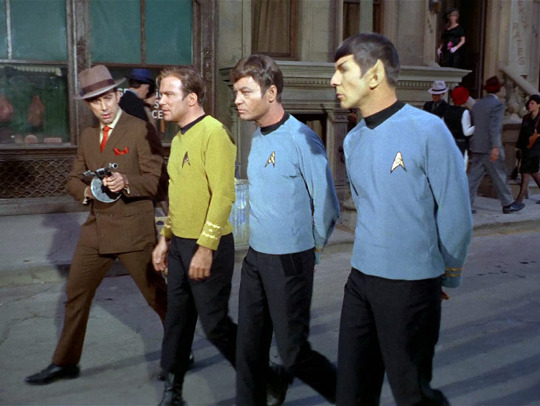
But the cast didn’t stop there.
The other characters of Star Trek, while not quite possessing the pop-culture iconography of the main trio, still hold their own rather impressive cultural footprint.
None more so than the chief engineer, Montgomery Scott.

Scotty’s job was to be a miracle worker, solving impossible problems in impossibly small amounts of time. Whether it was the transporters, the phaser banks, the shields, or the engines, Scotty was the man for the job. Nobody had a better understanding, or love for the Enterprise than Scotty (except maybe Kirk). He was the king of outside-the-box solutions, and had the Enterprise jury-rigged to push her past her limits more times than can be easily counted. As the name implies, he was also Scottish, and extremely stereotypically so. Kilt, whiskey, haggis and all, Scotty was extremely proud of his heritage (though not quite as much as Chekov). Fitting the traditional stereotypes, Scotty had a fiery temper, with a Berserk Button triggered by any insult to the Enterprise. A Gadgeteer Genius (and the inventor of Scotty Time) as well as a Genius Bruiser, Scotty was both the brains and brawn, more than capable of holding his own in a fight, or thinking of a new, creative way to push the Enterprise past her capacity.
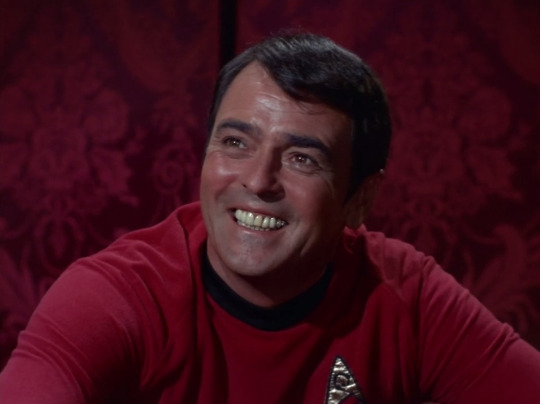
Scotty also held the distinction of being third in command, routinely taking the Captain’s chair when both Kirk and Spock were in the landing party. He was also the focus of a few episodes, making him a rare character with a Day in the Limelight, with episodes such as Wolf in the Fold, The Lights of Zetar, By Any Other Name, and The Trouble with Tribbles giving him a little more screen time and story than is typical. Scotty was an indispensable member of the crew, a life-saver on more than one occasion, and another of the legendary, iconic characters of the original Star Trek.
But it didn’t stop there.

Lieutenant Nyota Uhura was another prominent character. As the ship’s communications officer, she codified the term ‘Bridge Bunny’, although she proved herself far more useful than she’s typically thought of. Whenever given the chance, Uhura is a capable Action Girl, intelligent, witty, and good at her job, being extremely fluent in multiple languages. She too got her days in the limelight, with episodes such as Mirror Mirror, The Gamesters of Triskelion, and The Trouble with Tribbles giving her more to do than just sit at her station and say ‘hailing frequencies open’. Uhura was Silk Hiding Steel, not typically in the heat of the battle, but tough as nails when she had to be. (I’ve talked about Uhura’s extensive influence on the real world in the Legacy article, but even that doesn’t scratch the surface of what Uhura’s impact has been.)
There were others on the bridge crew of equal importance, including the ship’s helmsman, Hikaru Sulu.

Sulu was a level-headed officer, amiable and cultured, with an extensive knowledge of botany, fencing, and antiques. Yet another Deadpan Snarker (it must run in the cast), Sulu is another Genius Bruiser, as skilled in fighting as he is in his piloting, with a great sense of humor. He is given special attention in episodes like Mirror Mirror and The Naked Time (Albeit as evil, and Brainwashed and Crazy), but often got great character moments in multiple episodes (especially Shore Leave). A reliable officer and loyal to the core, he made an interesting character by himself, although he did end up forming a fun ‘Those Two Guys’ dynamic with the youngest of the cast, Pavel Chekov.

Chekov was introduced in season 2 as the navigator of the Enterprise. A bright young man with a fierce, passionate loyalty to Mother Russia (which evidently invented every good thing known to man), Chekov tended to be at the receiving end of a lot of the embarrassing agony in the series (mostly because Walter Koenig had a great scream). Also serving as a relief science officer, Chekov was plenty smart, if a bit of a Cloudcuckoolander, and the king of Cultural Posturing. Reckless and impulsive to balance Sulu’s calm good humor, Chekov’s temper tended to get the better of him. Like the others, he’s given a bit more screen time in episodes such as Mirror Mirror, The Trouble with Tribbles, The Way to Eden, The Deadly Years and Spectre of the Gun, but got to shine in plenty of other episodes, demonstrating his capabilities (despite being ‘The Intern’ and the Plucky Comic Relief) as a competent officer. Unsurprisingly, he was yet another Deadpan Snarker, lending his style of jokes well to bounce off of Sulu’s drier humor.
But there was more to the crew than the bridge.

Another crew member of note was Christine Chapel, one of the nurses who operated in the sickbay. Chapel was notable for having an attraction to Spock, as well as being another in the long line of Enterprise Deadpan Snarkers. One of the most caring of the Enterprise’s crew, Chapel was given larger roles in episodes like The Naked Time, What Are Little Girls Made Of?, Amok Time, and Plato’s Stepchildren.
Arguably though, one of the most important characters in all of Star Trek was the Companion Cube: the Enterprise herself.

The Enterprise was one of the most powerful ships in Starfleet, a character in her own right. The epitome of the Cool Starship, the Enterprise was well known for Explosive Overclocking, and always coming through in the end (with a little help from Scotty). A Lightning Bruiser of a ship, the Enterprise became as legendary as her captain and crew, as beloved as the characters themselves to the point where one of NASA’s shuttles was named after her.
The characters of Star Trek are legends, both in and out of universe, and they are for a reason. No member of the crew is useless. Everyone has a purpose and a job to do, and each was distinct and unique. No two characters were the same, and each brought their own special personality and abilities to each episode they appeared in.

And that’s what made the drama of the show work so well.
Each character felt real, memorable and genuine. We as an audience worry for them with each danger, and cheer with each victory. We liked these people. We cared about what happened to them.
And they worked.
In each scenario and situation, the characters found new and interesting ways to deal with the circumstances, while never losing the core elements of their personalities. That’s important, hugely so. These characters were loved, and still are, for a reason. They work very well as characters, both in main and supporting roles, providing entertaining and compelling figures for the audience to invest in. The balance between relatability and entertainment was hit perfectly for every single character, allowing everyone to shine in their own ways in each episode. They felt real, and in the end, that’s the point of a character.
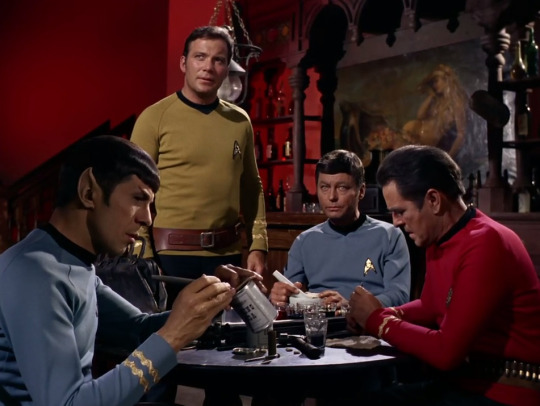
After all, one doesn’t get to be some of the most iconic television characters of all time by being boring.
Thank you guys so much for reading! Join us next time as we discuss Star Trek’s place in the times and the culture. If you have anything you’d like to say, don’t forget to leave an ask! I hope to see you all in the next article.
#Star Trek: The Original Series#Star Trek#TV#Television#TV-PG#60s#Drama#Action#Adventure#Sci-Fi#Science Fiction#William Shatner#Leonard Nimoy#DeForest Kelley#James Doohan#Nichelle Nichols#George Takei#Walter Koenig#Majel Barrett#Gene Roddenberry
133 notes
·
View notes
Text
Disclaimers
Context, persuasion, and manipulation
To start understanding Gale, we need to talk about concepts that have been confusing some people. Although this section is not related to bg3 I believe it's extremely needed so we agree in which terms we are talking about these interpretations.
Importance of context in narratives
Context is the most important aspect of communication, and still yet, so overlooked in general by fandom. Take a character's line out of context, or paraphrase it with ill intent, and you can misinterpret them in any way you desire, because human interpretation can stretch that much. Context is key in the process of understanding the message we receive, without going to unnecessary extremes.
The definition of context is the setting where a narrative is situated. Context provides meaning and clarity to the intended message, it gives a deeper understanding of the direction of the writing. Literary context is background information or circumstances provided in the story to inform us why something is taking place, and how we should interpret it; it can also be the backstory of a character, provided in order to inform us about their behaviour and personality.
Context is critical, because it tells us, the receivers, what level of importance to place on something, what assumptions to draw (or not) about what is being communicated, and most importantly, it puts meaning into the message. The best thing about context is that it deepens our understanding of the message so that true dialogue can take place.
Difference between Persuasion and Manipulation
Persuasion is considered “ethically neutral” by some communication theorists. Others, such as Aristotle, stressed that persuasion is inherently good because it is one of the primary means through which truth becomes known. Persuasion involves shifting people's position. It involves careful preparation, the proper framing of arguments, the presentation of vivid supporting evidence, and the effort to find the correct emotional match with your audience.
Persuasion is ingrained within human communication to the point that people both intentionally and unintentionally promote beliefs and behaviours in their conversations. Consequently, persuasion is not a matter of choice; it is inherent in social interaction. It is through persuasion that positive change occurs. Persuasion helps forge peace agreements between nations, or convince an alcoholic or drug-dependent family member to seek professional help. Persuasion is a tool used by parents to urge children not to accept rides from strangers or to allow anyone to touch them in a way that feels uncomfortable. In short, persuasion is the cornerstone of a number of positive, pro-social endeavours. Very little of the good that we see in the world could be accomplished without persuasion.
On the other hand, manipulation is the perversion of persuasion. It is not concerned with truth, but rather deceit. How can we distinguish between persuasion and manipulation? The following are the three most common elements to analyse if a message is manipulative.
Intention: Intention is a primary factor in judging whether a request is manipulative. If a person attempts to present an idea or behaviour that is not in the best interest of another, they are engaging in manipulation. Sadly, this is all too common. People frequently fall into the trap of abusing others in the pursuit of what they desire.
Withholding Truth: Manipulation involves distorting or withholding truth.
Coercion: Coercion is the third and most obvious component of a manipulative appeal. It is the removal of free choice, the ultimatum: "do it or else". In contrast, persuasion involves influence, but never force.
Summarised from here.
However, it's also important to highlight what many psychologists point out: non-deliberate manipulation can be born out of insecurity or out of a lack of understanding of how to communicate feelings, so it is not always toxic. To truly understand the intention behind the perceived manipulative action, we need the context of the situation.
As an addition to these topics not so related to bg3 in appearance, I want to suggest to read this disclaimer, which explains the importance to separate the knowledge that a character has (in this case our Tavs) and the meta-knowledge provided by the game, only known by the player (approvals system and Narrator information after successful checks).
It's also worth noticing that the popularisation of professional terms has burnt the concept, misleading the perceptions of the interactions for the worst, or simply dismissing the real meaning of the words. This has been happening in the last years with words such as depressed or hyperfocus, misusing them for simply describing "down" times and intense focus or enthusiasm. In this way, manipulation, coercion, gaslighting, narcissism and other professional words are starting to suffer the same effect which only causes a big misunderstanding, magnifying situations without reason, and dismissing and bastardising the real psychological/sociological issues. We all live in a very, very polarised world, so we need to be adequate with the words so we can reinforce the complexity of the situations and do not deny the existence of a spectrum of greys in-between
→ More in Analysis Series Index
15 notes
·
View notes
Text
The Creeping Reality of V for Vendetta
https://ift.tt/2pIaT0k
It's not the Fifth of November yet but that doesn't mean we can't consider how V for Vendetta's dystopian future is closer than ever.
facebook
twitter
tumblr
Remember, remember the fifth of November, the gunpowder, treason, and plot. I know of no reason why the gunpowder treason should ever be forgot.
These are the words that have accompanied hundreds of Guy Fawkes Day celebrations ever since that eponymous Catholic failed to blow up Parliament in 1605. But for many millions the world over, the poem is now synonymous with V for Vendetta, a shockingly subversive studio movie that was released in 2006. More than a decade later that film’s success at celebrating radical political ideas can still be felt by the fact that a movie which glorifies terrorist action (blowing up Parliament and Big Ben) is considered a classic in many circles, and is routinely viewed at the beginning of every November by movie fans the world over. It’s almost a fitting bit of irony that the film’s iconic visage of uncivil disobedience—the sleek and sexy reworking of a Guy Fawkes mask on Hugo Weaving’s face—has similarly become ubiquitous with anarchists, counterculture subversives, and online hackers, who all wear the trademarked Halloween item… that they helpfully purchase from the very capitalist friendly Warner Brothers’ merchandising arm on Amazon.
Nevertheless, the film is always worth remembering on Nov. 5 (or any other day), because director James McTeigue and the Wachowskis’ best screenplay to date succeeded at shrewdly adapting the V for Vendetta graphic novel to the big screen. Alan Moore purists might forever remain skeptical of such praise since by reimagining a seminal anti-Thatcher ‘80s hit piece, the Wachowskis essentially reworked the entire narrative as a brutally anti-Bush allegory (and reconfigured Weaving’s V and Natalie Portman’s Evey as a surprisingly convincing star-crossed pair of lovers from The Phantom of the Opera mold). In the process, Moore’s V went from being the poster child for anarchy to a defender of classical liberalism.
But on its own cinematic terms, V for Vendetta combines slick R-rated action movie set-pieces (that are appropriately theatrical for a comic book adaptation) alongside some pointed criticism of the U.S. government circa 2006, specifically in regard to the War on Terror and the persecution of minorities in right-wing media (remember folks: as recently as 2004, a president ran a successful national campaign by pledging to make a constitutional amendment that banned gay marriage). The film may have unintentionally also endorsed the use of torture for political radicalization, but that’s neither here nor there.
Watch V For Vendetta on Amazon
Just as sweeping as its brava rebranding of Tchaikovsky’s “1812 Overture,” V for Vendetta remains a pop culture artifact about the anxieties felt on the left in the waning years of George W. Bush’s presidency. And with it being so specifically fitted to those critiques, it should in theory seem very dated in the third year of President Donald Trump's tenure in the White House.
Yet, if one looks around, it becomes apparent that we are tiptoeing ever closer to the dystopian future that V for Vendetta warned so vehemently against…

A Government for the People That Watches the People
One of the most chilling (and familiar) beats of dystopian hell envisioned in V for Vendetta is the Orwellian presence of a Big Brother. The film’s cartoonish dictator, High Chancellor Adam Sutler, is clearly meant to resemble Adolf Hitler. However, the filmmakers also selected John Hurt for the role of the tyrant who stripped away his country’s civil liberties. This canny casting recalls George Orwell’s Nineteen Eighty-Four since Hurt starred in the actual 1984 adaptation of that book.
And like that story’s infamous Big Brother, Sutler’s Britain is under constant surveillance by roaming trucks that are eavesdropping on every dinner table, phone, or digital conversation amongst its citizens. This is an obvious allusion to the U.S. PATRIOT Act, which provided extraordinary freedom to government agencies to pursue suspected terrorists in October 2001 (less than two months removed from the shadow of 9/11). And its encroachment on civil liberties was as disquieting in 2006 as it is in 2019—after it was extended twice during the Obama administration.
As a U.S. senator in 2005, Barack Obama spoke precisely about reforming the law: “We don’t have to settle for a PATRIOT Act that sacrifices our liberties or our safety—we can have one that secures both.” Yet elements of the PATRIOT Act were only allowed to temporarily expire in its June 2015 extension due to the maneuvers of Senator Rand Paul. Meanwhile Obama, a president I greatly admire, continued to run afoul of civil liberties groups and privacy advocates.
In fact, it was during his administration that Edward Snowden, a former contractor for the National Security Agency, unleashed a cascade of classified documents that showed the NSA was secretly utilizing a global system of surveillance that was gathering massive amounts of information about the private correspondence of both American and foreign citizens. Initially, the White House’s reaction was to brand Snowden as “not a patriot” (he currently lives outside the reach of extradition in Russia) and to suggest that the American people simply needed to become “comfortable” with the NSA’s mass bulk collection of millions’ phone records.
But eventually the Obama White House reversed course, first by appointing a panel to quell concerns of “distorted” information in the press about the “drip, drip” and “Big Brother” perception the U.S. government ascertained overnight. Subsequently, Obama pivoted closer to the side of civil liberties (especially after a U.S. federal judge ruled the bulk collection was probably unconstitutional). In June 2015, the NSA lost the carte blanche authority to collect millions of Americans’ phone records via the White House supported USA Freedom Act (the NSA now needs a targeted warrant from the FISA court).
So, all is well that ends well in this particular case, right? Maybe, except Snowden is still living in exile and considered a traitor by many government officials, the PATRIOT Act persists, the aforementioned parts that Paul was able to see expire were reinstated by the USA Freedom Act, telecommunications companies can still stockpile Americans’ bulk data, which the FISA Court allows access to with a secret warrant, and it is so easy to imagine a scenario where a president less constitutionally minded would not choose to introduce a bill after an intelligence agency was caught with its hand in the wiretapped cookie jar. Or one who would seek to expand its powers further when the PATRIOT Act comes up for renewal again.
In fact, given many of the strongest political winds at the moment, it seems that for every step forward, we’re about to take 50 goosesteps back.
Video of V For Vendetta - 3 - Control Through Fear
The Spread of Misinformation
Another hallmark of any good dystopian yarn is a state-run media arm that inundates and brainwashes a public via the spread of propaganda. Hence one of the most exciting moments in V for Vendetta is when the titular anti-hero invades and commandeers what is clearly intended to be a stand-in for Fox News, using their ability to infest every home in England to now instead offer a rousing cry of “vive la révolution!”
Of course even in 2006, it was unfair to conflate Fox News with being a government-run puppet of the Republican National Party or the Bush administration. In many ways, the tail wags the dog with Fox News setting the Republican Party's agenda, especially now that its standard-bearer prefers getting his news from Fox & Friends as opposed to his own intelligence agencies. By contrast, V for Vendetta simplified mass media misinformation for the sake of narrative brevity. Indeed, the point about the dangers of media misinformation are only more pronounced now than they were 10 years ago.
read more: The Best Dystopian Movies and TV Shows
As broadcaster Edward R. Murrow once prophesized in 1958, “For surely we shall pay for using this most powerful instrument of communication to insulate the citizenry from the hard and demanding realities, which must indeed be faced if we are to survive.” At the time, Murrow was musing about the decline of broadcast news during a period where there were only three channels on television. Today with the increasingly endless variety of media resources in a post-internet and post-social media world, the dissemination of lies and falsehoods is greater than even the Wachowskis’ paranoia could imagine during the pre-iPhone naiveté of 2006.
With more information than ever at folks’ fingertips, the desire to insulate one’s self in a media echo chamber has ironically become only more desirable for millions.

To use V’s veiled punching bag of Fox News as an example, a University of Maryland study in 2010 found that Fox News viewers were more misinformed about factual information than those who consumed their primary news stories from any other major resource. Also, misinformation is arguably more dangerous to public discourse than even uninformed voters, because the misinformed are often more confident in clinging to discredited information.
Nine years later, it’s now a lot easier to fall down the rabbit hole of innuendo and ideological fanaticism (i.e. lies) than it was in the age when cable news reigned supreme. The more people become insulated in partisan echo chambers, the easier it is to create the effect of a brainwashed society hinted at in V for Vendetta—government run or otherwise.
Consider that Frank Luntz, a Republican pollster and once frequent Fox News commentator, showcased this bizarre resistance to reality among a group of Donald Trump supporters. Preferring a particular political candidate for president was their right, but when Luntz emphatically proved the future Republican nominee Trump lied about how many Syrian refugees President Obama attempted to bring into the U.S. in 2016—for the record it was 10,000 refugees while Trump falsely asserted it was 250,000—the reaction was apathy, including comments like “he’d let in as many as possible” and “what is in his heart?”
Luntz further found that only three of the 29 Trump supporters sampled believe that Obama is a Christian. One even insisted that he believed Obama was sworn into office in 2009 on a Quran. Also the general consensus was to prefer news from far right-wing leaning media like Breitbart (a site that willfully sided with the Trump campaign over its own reporters, even in an incident of alleged physical assault) and talk radio while anything considered “mainstream media” was to be viewed with hostile skepticism and outright denial. This was years before a fanatical Trump supporter, who watched the president call all non-right-wing media “the enemy of the people,” mailed several pipe bombs to CNN in addition to those of nearly a dozen of Trump's political opponents and critics.
Additionally, Steve Bannon, the former executive chairman of Breitbart News LLC, was hired by Donald Trump to be his campaign's CEO, further muddying the waters of collusion between political leaders and the partisan, extremist media they court--although after Bannon fell out of favor with the mercurial president, Breitbart happily threw him to the wolves and fired the fallen Trump advisor from his returned chairman role, all to curry favor with the veritably lying and tweeting president.
In this current climate of media tribalization, it is far easier for a demagogue like Sutler to lie his way to power and to then retain it.
Video of Opening scene from V for Vendetta
Persecution of Minorities
V for Vendetta begins with a blunt and on-the-nose depiction of the kind of politics that High Chancellor Adam Sutler and his Norsefire Party represent. Roger Allam’s Lewis Prothero is obviously meant to be a cross between Howard Beale and Joseph Goebbels when we hear his televised voice before even realizing we’re watching Natalie Portman and Hugo Weaving’s robed introductions.
From the very first frame, Prothero, and by extension the political party he represents, hisses his disdain for those inherently responsible for all of the problems in the world: “Immigrants, Muslims, homosexuals, terrorists, diseased-ridden degenerates, they had to go! Strength through unity, unity through faith!”
read more: The Best Sci-Fi Movies on Netflix
Drawing a parallel between the nativist bigotry represented by V for Vendetta and the current disintegration of the Republican Party is like tracing with a ruler. While V for Vendetta’s fears about the persecution of the LGBT community turned out to be thankfully unfounded in the Obama Years with “Don’t Ask Don’t Tell” repealed and gay marriage now the law of the land, everything else Prothero espoused hatred for is again in the national conversation… except with even less nuance. This includes how the Trump adiministration is targeting people who identify as transexual as Other, beginning with banning them from the military.
It would almost be redundant to bring up how Donald Trump—the preferred president of David Duke, a former Grand Wizard of the KKK, and Neo Nazis everywhere—suggested in 2015 that we should ignore the Constitution and founding tenets of this country by creating a religious litmus test for entry while banning all Muslims (which he has now made a restricted version of the law of the land via executive order). So let’s just focus on what the man who once inferred he did not know what the KKK represented. While on CNN in 2016, the GOP candidate said, “I think Islam hates us.” For the record, this also insinuated merit to Anderson Cooper’s question about whether Trump believed Islam was “at war with the West?”

Let this sink in: The President of the United States insinuated that a religion of 1.6 billion people (that’s roughly 23 percent of the global population) is at war with the United States. It certainly gives his voters a boogeyman to fear in the shape of nearly three million fellow American neighbors. In the 2018 midterms, he shifted the focus back to his original boogeyman when he turned the media's attention to an “invasion” of South American refugees from a crumbling caravan a thousand miles away walking through Mexico on foot.
V for Vendetta features flashbacks of Sutler rounding up British Muslims, and gay and lesbian citizens to be taken to camps. While Trump has not suggested anything quite that drastic for Muslims (yet), he campaigned pretty damn close to it in regards to undocumented immigrants. And then he acted on it as president, supporting and then attempting to defend a policy designed to ruin immigrant families by locking children in cages. This makes good on a campaign launched by the claim that a majority of undocumented migrants are “rapists,” which in turn led to millions of Trump supporters chanting “build a Wall.”
One imagines that if Prothero was a real person, he’d have been in the bleachers right next to them, talking about how he also agrees about shipping off minorities in a “humane” way to a place where they’d be “happy.”

“He’s Completely Single-Minded and Has No Regard for Political Process”
Ultimately, however, the easiest way to glimpse our ever growing flirtation with Sutler’s future is to see how parts of our culture already march to the sound of the fictional character’s bark. Midway through V for Vendetta, V surmises that Sutler’s career began with “a deeply religious man and a member of the conservative party. He’s completely single-minded and has no regard for political process. The more power he obtains, the more obvious his zealotry and the more aggressive his supporters become.”
Obviously, the Wachowski Siblings, as well as Alan Moore before them, were revisiting the rise of Adolf Hitler in a modern context. I would not suggest that it is a 1:1 comparison, but so much of how V describes Sutler could be used at this very moment to detail the popularity of Donald Trump.
In terms of political process, one only has to look at the Republican president’s woefully dishonest campaign promises and then often fractured policy, be it rounding up illegal immigrants or now claiming he has the power to revoke birthright citizenship without a Constutional amendment, despite it being enshrined in the 14th Amendment. In 2016, he ranted and raved about how he plans to immediately deport 12 million people living in America without due process, a claim he echoed in 2018 by playing ignorant to due process. Even Bill O’Reilly once called him out on that fact, pointing out in 2016 that under the Constitution, anyone detained on American soil (i.e. not just crossing the border) has the right to be processed in our judicial system—a harrowing (and impossible) feat if it is to be immediately implemented around 12 million times. Yet Trump just shrugged the facts off, repeating, “They’re here illegally,” as if repetition and magical thinking will make it constitutionally sound or at all humane.
Then again, Trump’s entire rhetorical approach has already been documented as operating on a fourth grade reading level, and it is as effective as the emphatic leader of V for Vendetta’s fictional conservative party. Increasingly, folks cheer when he suggests attacking cornerstones of American life like the freedom of the press. Much like how Sutler reacted to a political TV parody that made him look the fool, the Donald let his thin skin show when he suggested, with the utmost earnestness, that one of the things he wants most is to “open up libel laws.”
Even if the Supreme Court settled long ago in 1964 that you need to prove an organization reported inaccurate information it knew to be false with malicious intent, Trump would like to be able to sue “The New York Times [when they write] a hit-piece which is a total disgrace or when The Washington Post, which is there for other reasons, writes a hit-piece. We can sue them and win money instead of having no chance of winning, because they’re totally protected.”
His whining about the press suggests a chip on his shoulder worthy of when Sutler had a late night comedian disappeared into one of Creedy’s black bags.

Yet these are applause lines for supporters who are indeed embracing V’s visions of a dystopic 21st century where the more power Trump receives, the more aggressive they become. With almost every Trump rally during the heated primaries, there seemed to be another attack, another beating, and another protest devolving into chaos. In January 2016, Trump told an Iowa crowd, “There may be somebody with tomatoes in the audience. If you see somebody getting ready to throw a tomato, knock the crap out of them, would you?... I promise you, I will pay for the legal fees.”
Two months later in North Carolina, a black man was sucker punched by a Trump supporter as he was being escorted by police out of the facility, and it was captured on video. Despite visual confirmation of an unprompted burst of violence from a white supporter toward an African American protestor, Trump lied to his supporters when he said, “It was a guy who was swinging.” He then condoned the violence by saying, “I thought it was very, very appropriate… that’s what we need a little bit more of.” He then later would not refute the alleged attacker’s claims that the protestor was a member of ISIS.
After his ascendency to the White House, many emphatic supporters of Trump have become more violent instead of less so. When a visceral orgy of far-right politics converged on Charlottesville, Virginia in 2017, Neo Nazis, Neo Confederates, and card carrying members of the KKK celebrated an event titled "Unite the Right," including a number of supporters dressed in President Trump's preferred golfing attire as they marched with torches and chanted "The Jews will not replace us," word-for-word the same cries made by Nazis at 1930s rallies. The following day, one such far-right extremist drove his car into a crowd of counterprotestors, killing 32-year-old Heather Heyer. The following week, Trump gave rhetorical cover to racist supporters by saying "there were very fine people on both sides." A year later, a Trump enthusiast sent bombs to Trump critics. A year after that, a far-right terrorist opened fire in a Walmart in El Paso, Texas, killing 22 people and injuring another 24.
Eventually, this is going to devolve into something even more tragic and reminiscent of the 1930s.
How is this anger growing right now in a country that actually has seen a growth in job creation, GDP, and access to healthcare while a decrease in the deficit and unemployment over the last six years of Obama's presidency and then increasingly so in the Trump years? There is an obvious racial and deplorable component for a number of voters in this country from the David Duke mold. Still, there are also reasons for justifiable anger with a cataclysmic income inequality gap and stagnant wages, the undeniable stench of money in politics, and the ever modern and unending anxiety of the new century: the threat of terrorism. But demagogues like Sutler and Trump are exploiting these fears and frustrations with such ridiculous ease, and building it on a foundation of hate, nationalism, and bigotry, that it seems almost fictional.
But if you think all of this is slanted, partisan hooey, watch V’s impassioned plea for the people of England to set aside their fear and face an ugly reality inside their culture. Then admit that it is not prescient for the direction our country is headed in.
Video of V for Vendetta: The Revolutionary Speech (HD)
So yes, Americans are closer than ever to achieving the dystopian future imagined for England in V for Vendetta. That’s something to remember, remember for the fifth of November.
A version of this article first ran on March 17, 2016.
David Crow is the Film Section Editor at Den of Geek. He’s also a member of the Online Film Critics Society. Read more of his work here. You can follow him on Twitter @DCrowsNest.
Read and download the Den of Geek NYCC 2019 Special Edition Magazine right here!
facebook
twitter
tumblr

Feature
Books
David Crow
Nov 5, 2019
V For Vendetta
The Wachowskis
Natalie Portman
Hugo Weaving
from Books https://ift.tt/2JjXiVW
3 notes
·
View notes
Text
Reflecting on Reflections: Body image and Social media
Social media serves as a method for people to portray themselves for others to see on these social platforms. The issue with individuals being able to not only post, but edit these images is that the people viewing these posts are not able to discern whether these are genuine or not. This blog post will concentrate on social media's impact on body image and the potential impact on the individual.
As new as this problem may seem, this is a well-rooted problem. Social comparison theory states that "people have the drive to evaluate their progress and standing on various aspects of their lives and, in the absence of objective standards, people compare themselves to others to know where they stand" (Festinger, 1954 cited in Fardouly et al, 2015, pg. 38). If we were to apply social comparison theory to social media, it serves as a perfect environment to let comparisons of one's self to other individuals run rampant. These comparisons can result in "widespread body dissatisfaction among girls and women in western cultures" (Engeln–Maddox, 2005, pg. 1114). Within the research around this subject, the individuals talked about are usually women. It is commonplace to witness videos on social media platforms such as Instagram for instance that readily give information on how to attain the ‘desired'. Posts of this nature instruct these women by "dieting, exercising, and body contouring surgery, encouraging female consumers to believe that they can and should be thin" (Yamamiya et al, 2005, pg. 75). Through this quote, it can be discerned that the bodies of these women require regulation to be desirable to wider society and, arguably, this can be seen to be the epicentre of the anxiety surrounding the perception of one's self.
As stated above, the social media platform Instagram serves as a way for individuals to project their desired selves and their actual selves in the same place (Moon et al, 2016). A noteworthy aspect of Instagram is the ability to edit photos that are then uploaded for other users to see. Another striking aspect regarding warping perception is the application of filters and how they can be used to distort the user's image (Lup et al, 2015). This further shows and elucidates the divide from the actual self and the desired self. In a somewhat ironic fashion, the application of filters further fuels the unreal expectations that are yielded from social media platforms in their current form. An interesting perspective on this topic is the fact that through social media, an individual is only allowing you a certain point of view to interpret, thus only allowing a single version of themselves to be regarded as the authentic self (McLean et al, 2015). This allows the user to create their narrative of which they will exist in, thus allowing the individual to exist in whichever account they choose. A prime example of this would be an individual who seems to be thriving in their life within the images and videos that they post on their respective social media platforms, but the situation they find themselves in could be the exact opposite.
Ultimately, social media plays a large role in the way that we perceive our bodies and directly impacts our self-esteem. The blog post approached the topic from a theoretical perspective and applied the social comparison theory to understand the comparisons of bodies through social media in a deeper manner. The blog post then observed how women on social media have their appearances dictated to them through posts that provide information on how to achieve certain goals regarding their body. Following on from this, the blog post examined how social media allows its user to create their own perceivable self in both the online and offline sphere to showcase how the individuals life can be portrayed in different manners.
Until next time,
C.
References;
Engeln–Maddox, R., 2005. Cognitive responses to idealized media images of women: The relationship of social comparison and critical processing to body image disturbance in college women. Journal of Social and Clinical Psychology, 24(8), pp.1114-1138.
Fardouly, J., Diedrichs, P.C., Vartanian, L.R. and Halliwell, E., 2015. Social comparisons on social media: The impact of Facebook on young women's body image concerns and mood. Body Image, 13, pp.38-45.
Lup, K., Trub, L. and Rosenthal, L., 2015. Instagram# instasad? exploring associations among instagram use, depressive symptoms, negative social comparison, and strangers followed. Cyberpsychology, Behavior, and Social Networking, 18(5), pp.247-252.
McLean, S.A., Paxton, S.J., Wertheim, E.H. and Masters, J., 2015. Photoshopping the selfie: Self photo editing and photo investment are associated with body dissatisfaction in adolescent girls. International Journal of Eating Disorders, 48(8), pp.1132-1140.
Moon, J.H., Lee, E., Lee, J.A., Choi, T.R. and Sung, Y., 2016. The role of narcissism in self-promotion on Instagram. Personality and Individual Differences, 101, pp.22-25.
Yamamiya, Y., Cash, T.F., Melnyk, S.E., Posavac, H.D. and Posavac, S.S., 2005. Women's exposure to thin-and-beautiful media images: Body image effects of media-ideal internalization and impact-reduction interventions. Body image, 2(1), pp.74-80.
1 note
·
View note
Photo

Those who controls the media's programming that a targeted population receives, also controls what they believe. Because white sources controls the media contents that Black people routinely receives, they've used this monopoly to negatively control what Black people believes about themselves. More specifically they've used this monopoly to indoctrinated self hating and divisive thoughts (and ideologies) into the minds of Black people that serves and protects the interest of white societies. Most people believes that the media reflects our reality, but in truth it's most often we that function based upon what we see and learn from the media. Therefore the media most often forms our perception of ourselves and of reality through the contents it routinely presents to us. If a targeted population is constantly inundated, through the media, with false negative information about themselves, in time they will eventually come to accept the false assessments of themselves --and start functioning based upon its false information. The constant negative messages will create self hate, self doubt and disunity among the targeted population. It will also make them more compliant with the dominance of other groups over their lives. It doesn't matter that the negative messages are not true, most among the targeted population, will respond in the same negative manner because they've all been repetitively presented the same negative lies about themselves. Their false negative perceptions of themselves becomes their perceived reality. Some among the targeted population will become so convince that the media's false negative depictions of themselves are true, that even when presented with evidence to the contrary- that proves that the media is lying- they still will insist that the media negative depictions of themselves are true although they're not. For these stubbornly brainwashed types the effects may be non-reversible. This warfare tactic is a very effective method used for controlling and subduing large targeted populations. White media social engineering scientist and propaganda experts have studied this media phenomenon for many decades and presently uses it to effect the beliefs, and influence the behaviors of Black populations. Presently there are white social engineering scientist and propaganda experts that works behind the scenes manipulating the perceptions and opinions of the Black masses according to the will of the ruling white elites. These men govern our minds, molds our opinions of the world, and of ourselves through the societal information they routinely present to us. People are easily controlled by the information they routinely receive about themselves. When people routinely receive positive affirming information about themselves this unifies and uplifts them. However, when people routinely receives negative demoralizing information about themselves, this makes them self hating, self doubting and divides them. It also makes them more compliant with their oppressor's dominance over their lives. This demoralizing conditioning process is what's being done to Black people by white societies through the white media. The white media's unrelenting negative depictions of Black people-- that amplifies the negative to the point that it distort reality-- is much more than just bias media reporting. It is actually a black racially demoralizing psychological warfare program. Because the white ruling elites controls all black statistics, national narratives, and even how the black image is depicted with the media these factors allows white social engineering scientist to negatively control what Black people believes about themselves. More specifically this allows them to shrewdly indoctrinate self contemptuous thoughts and ideologies into the collective minds of Black populations that serves and protects the interests of their white dominant society. The basis of this concept of warfare works by affecting the subconscious minds of the Black population through demoralizing propaganda. Its weapon is the demoralizing message that it carries and the way that it adversely affects the Black population in terms of their behavior. This system is deplored like a massive media marketing campaign that constantly subjects Black people to seeing only the fraudulent worst within themselves. Within this system fraudulent black racially demoralizing information is pumped unrelentingly into the unsuspecting minds of Black populations--without being challenged or counterbalanced by an equal amount Black positive racially affirming information. With time, being unable to refute nor confirm the constant negative messages and deficiencies about themselves, the Black population grows weary by them, and will eventually comes to accept these negative assessments of themselves. The taunting unconsciously influences how the Black population perceives themselves, subsequently causing them to become embarrassed of themselves, doubting themselves, hating themselves and, eventually, fighting among themselves. This warfare works by tapping into the immense power that shame has upon the human mind. This media programming system also conveys the subliminal message that Black people are there own worst enemy and therefore needs whites to govern over their lives. Moreover, that Black people should admire, respect, and trust only Whites. This system is extremely effective because when Black people are repetitively presented narratives and statistics from trusted white sources constantly conveying the message that whites are superior, and that they (Black people) are their own worst enemies it can be very difficult to resist it's implied propaganda programming. Especially when the propaganda is being told daily and so unrelentingly. This programming turns the collective frustrations and aggressions of Black people away from their white oppressors and turns them inward towards themselves. It also makes Black people more compliant white dominance over their lives. It doesn't matter if the information presented is untrue most Black people will act upon it because they have all been given the same misinformation about themselves. Those Black people that do not think critically--and question the validity of all information being constantly fed into their minds from entirely white sources--never notices what is being done to them. This is all possible because people are like a computers, all you have to do is keep giving them certain information every so often and you can persuade an entire generation towards an implied objective. Because the ruling white elites controls all Black statistics, national narratives, and even how Black people are depicted within the media these factors allows them to easily negatively control how Black people perceive themselves. When the past blatant racist systems, used for maintaining white dominance, became no longer socially unacceptable the ruling white elites secretly implemented this much more covert method for maintaining their white dominance. Most of us believe that the media reflects our reality, but it is in fact rarely ever the case. It is most often we that function based upon the societal information presented to us through the media. It doesn't matter if the information presented is true, or not most will act upon it because they too have been given the same information. The definitions of values by which people operate are greatly influenced by the mainstream media. It is in this way that the media forms our reality. This is because people are like computers, all you have to do is keep giving them certain information every so often and you can persuade an entire country or nation towards an implied objective. Because perceptions created by the media leads to non-deliberate thoughtful decision-making or decision below the level of consciousness. It has been called "thinking without thinking", and it ultimately leads to unconscious similar behaviors. It is in this way that the media actually controls us. This is being done to Black populations as a means of protecting white dominance. Although all white governments now professes equality for all citizens, in reality they are all secretly committed to the preservation of their nation's white dominance. This is also being done to Black populations, in particular, because there is an immense fear of Black retribution that secretly exist among those white nations that benefited historically, and continues to do so presently, through their exploitation and mistreatment of Africa and its people globally. To protect themselves from Black retribution those white nations secretly deployed a demoralization system against the minds of Black people. This system provides the white elite with a proficient method of control over Blacks given that it isn't easily recognized nor comprehended by many of its Black victims. For unlike the past blatant racist systems that Black people were easily able to identify and therefore develop counter strategies against, this system is not easily recognized nor comprehended by many of its Black victims. This psychological warfare program works so well in fact that it not only makes Black people more compliant with white dominance over their lives, it in fact makes many even prefer it.It is at the root of both the profound division and self hatred now afflicting so many Black people and is at the heart of internalized feelings of superiority that many whites possess. "The oppressed will always believe the worse about themselves" --Franz Fanon By Franklin Jones, the Black Matrix. WAKE UP!, wake up!!! This article is from the book the Black Matrix by Franklin Jones. The Black Matrix Learn more at www.theblackpeoplematrix.com
2 notes
·
View notes
Text
CLOA CP #5: With reference to relevant research studies, to what extent is one cognitive process reliable (e.g. reconstructive memory, perception/visual illusions, decision-making/heuristics)? (22)
Last on: Paper 1 May 2017 (TZ2)
INTRODUCTION This essay will consider the merits of reconstructive memory, as supported by studies investigating this cognitive process
OVERVIEW Reconstructive Memory my girl Offred where u at
Memory: cognitive process by which mental representations of knowledge are created over time from previous experiences
Memories are formed on the basis of childhood experiences, repetitive exposure, reinforcement of previous ideas/memories, etc.
Memory helps us organize information, guide our actions, and make predictions of the world
Memory is encoded (via different pathways), stored (in several different locations depending on the time), and retrieved
Memories aren’t exact replicas of events as we experienced them, but rather reconstructions based on pre-formed schemas
Thus, memory is not entirely reliable
Research in the CLOA has found that memories are not fixed; they can be modified, scrambled, created, or lost
Instead of remembering things exactly how they occurred, we remember the basic idea (the gist) and reconstruct our memories to some extent based on our other knowledge
Distortion of memory may occur for several reasons, including to enhance our self-esteem/self-importance
what a Big Mood honestly
Key Studies:
Bartlett (1932): War of the Ghosts Study
Loftus & Palmer (1974): Eyewitness Testimony
Loftus & Pickrell (1995): Lost in the mall
Schachter & Singer (1962): Adrenaline and emotion
Bartlett (1932): War of the Ghosts Study
Bartlit, am i right ladies & gents????
can you tell im tired
Aim
To investigate extent to which schema influences recall in order to determine if memory is reconstructive; also demonstrated the role of culture in schema processing
Background/Procedure
British participants told a Native American legend called “The War of the Ghosts”
Folk story full of unknown names and concepts; narrative style not familiar (not entirely chronological, etc.)
Two conditions
Repeated reproduction: participants asked to reproduce story after a short period of time, and then again over a period of days, weeks, months, or years
Serial reproduction: participants asked to recall story and repeat to another person
Findings
Significant difference between recall methods of both conditions
All participants altered story during reproduction (distortion)
Patterns of distortion included:
Assimilation: unconsciously making story more consistent with own culture
Leveling: participants omitted more and more information (especially if seen as relatively unimportant)
Sharpening: changed order of story, used more culturally-prevalent terms (e.g. more chronological, “boat” instead of “canoe”); added details & emotion
Conclusion
Recall is an active process, whereby information is retrieved and changed to fit into existing schemas
Maintains meaning in information and makes easier on brain (less mental resources allocated to remembering things exactly as they were)
Memories are reconstructions as opposed to copies
Evaluation
Reconstructive memory is a v important idea
High ecological validity, despite laboratory conditions
Not entirely controlled -- no standardized instructions and participants not asked to be as accurate as possible
Manipulation of IV did not lead to drastic change in DV (both groups performed similarly); did support idea of culture having a significant impact on memory
If culture is the IV, then quasi-experiment instead of lab experiment
Means only correlation, not causation :(
No control group!!
Emic approach to research
Loftus & Palmer (1974): Eyewitness Testimony
Aim
To investigate whether the use of leading questions would affect recall in a situation where participants were asked to estimate speed; related to reliability of eyewitness testimony
Background/Procedure
45 students shown car crash vids
Given questionnaires about specifics of car crashes
Critical question: “About how fast were the cars going when they [verbed] each other?”
Verbs used: hit, smashed, collided, bumped, contacted
Findings
When “smashed” used, highest avg. of speed (~40.8mph)
When “contacted” used, lowest avg. of speed (~31.8mph)
Phrasing of question therefore greatly impacted estimation of speed
Schema regarding each verb caused change in how event was remembered
Conclusion
Eyewitness testimony may be unreliable, especially when the q’s that are asked are asked with words of certain connotations (leading questions)
Schema unconsciously activated, causing a change in memory
Indicates unreliability of reconstructive memory
Evaluation
Confounding variable: assumption that people can perceive how fast moving objects are going
ok like straight up i can’t tell between a 5 and 12 year old like how do they expect ppl to be able to tell how fast a car is going???
Demand characteristics with regard to participants realizing that verb indicated what answer should probably be
Not generalizable b/c only students
Low ecological validity; might have been more accurate (or at least more vivid) if emotion played a bigger role
No distress regarding watching the crashes was reported, altho still kinda an issue
Loftus & Pickrell (1995): Lost in the mall
fun fact i actually have a “getting lost in the mall” story but i already put that elsewhere and im too lazy to type it again
Aim
To investigate the fallibility of memory by attempting to implant false memories
Background/Procedure
Participants told 4 stories from their childhood ostensibly from members of their own family
One of four stories was false -- story of participants being lost in a mall for an extended period of time when young
Mall based upon participants’ actual trips to the mall
Findings
25% of participants remembered that no such event occurred
Many participants able to provide “details,” despite event never occurring
Conclusion
Act of imagining event created false memory
Getting lost in a mall (esp. at a young age) is common, a fact that might be part of schema
Suggested that false memories can be induced, and relatively easily
Evaluation
Confounding variable that participants could have actually been in a similar situation???
ok but like i feel like elizabeth would check that beforehand but idk I guess??
Lab experiment, thus low in ecological validity
LTM store is triggered, suggesting involvement of emotion
Different cultures express different amounts of emotional arousal, thus may impact strength of imagined event turning into false memory
Sorta conclusion-y, but suggests therapists trying to assist patients might induce false memories (or memories assumed to be repressed???)
Schachter & Singer (1962): Adrenaline and emotion
Related to a lesser extent; suggests that social cues and schema regarding situations is what allows us to label certain emotions and attribute physiological arousal to different occurrences
We determine what we do and feel and then deduce our nature from it
First factor: physiological arousal; try to label based on surroundings
Second factor: decide how to use feelings we have
Memory dictating how we analyze ourselves, and thus altering subsequent memories
Memory as not entirely reliable as shown by how intense physiological arousal not actually attributed solely to environmental condition
0 notes
Link
http://ift.tt/2xVuhZB Profiling Narendra Modi’s Critics Note: This is a guest article by Sri Narasimha. India’s honourable Prime Minister Narendra Modi is the person people love to hate. Of course he does have his supporters and his sympathisers across all walks of life and demographics, particularly in non-urban places but the folks who own the presses and the airwaves, so to speak, dominate this emotion of hatred. I am a US citizen of Indian origin. I live and work in India for personal and professional reasons. I have `skin in the game’ here and want India to prosper. With that as background, I must first confess that I am both mystified and disturbed by what I see in India. The most appalling thing that I have observed among many Indians is this deep desire for India NOT to be strong. NOT to succeed. NOT to really change. Certainly NOT to win! I’m truly mystified by this self-loathing and overweening self-centredness, a fundamental inability to put the society and country ahead of personal or sectarian interests. Prime Minister Narendra Modi. Pic Courtesy: Google Image Search Categories of Modi Critics and Baiters Over the years, I have observed and met many Modi critics. These critics range from folks who either outright hate him or folks who are disappointed. In between, are a few other categories. 1. Professional Modi baiters: Essentially a variety of media persons and industry professionals who either did the brainwashing or were brainwashed about Modi being an evil person and point to the 2002 riots in Gujarat as evidence. Includes self-proclaimed leftists-liberals, supporters of the Congress party and its clones. Obviously, the political party ecosystem did the brainwashing. Many regular folks who got brainwashed will not change their minds. After all, it is easier to be fooled than to admit that you were fooled. 2. The aggrieved set: In this category are the folks who believe that the Hindu majority, over the last 70 years, has been marginalized by minority vote banks. They point to government control of Hindu temples, reservations and subsidies given to minorities as evidence of being systematically disenfranchised. The media has enabled and fuelled this picture by selective reportage of events and facts. By a variety of perception management tricks that preys on low critical thinking and built in prejudices, the media has demonized millions of ordinary folks while elevating others who suited their agenda. This category feels nothing has changed under Modi and feel let down by the first PM who conveys India and her civilizational pride. They see this social and legal distortion as the burning issue to be fixed and are losing hope that it will ever get fixed. 3. The closet `Singhis’: Overtly they say they support Modi as PM but have already decided that he has failed. These are not necessarily Congress party supporters but many well meaning folks who took pride in claiming that India had a PM who was an accomplished economist and decent human being. I have observed this pattern especially among a few smart, successful Sikhs who cannot digest the failure of Manmohan Singh as PM. This is clearly not about religion, it is just that a PM who was one of their own could have made them proud but ended his two terms being ridiculed and insulted. 4. The Status quo-ists: They have nothing against Modi personally but they hate him because he represents change. They see an orthogonal mind at work and a move toward structural disruption and this threatens their linear plans. Traders, Brokers, Industrialists, the Bureaucracy, and Intellectuals with preprogrammed DNAs who clearly found it easier to thrive under a predictable, venal arrangement. In this bucket are also people who like to claim that they are fair minded. `I actually want Modi to succeed but…’ is typically how they will start their narrative about how he can’t scale from a CM to a PM and how he needs to carry people with him and not be so autocratic. And with confirmation bias, they cherrypick slanted statistics. 5. Short-rope snipers: While they have given Modi a rope, it is very short and on the other hand they hold a sniper’s rifle. These are typically very smart academics and think tank types who are willing to hold their noses for some time only because they recognize that India was made ungovernable between 2012 and 2014. This category also includes folks who think he is a `vernie’ (someone who studied in a vernacular medium) and lacks the western sophistication. These snobs don’t fool me because I used to be one of them. Their mantra is `Not that we love Modi less but we love Raghuram Rajan more’ and includes economists and commentators on India’s economy. This group has a fantastic intellectual capacity but is theoretical in its approach. Most of them have never run anything in their lives, leave alone a turnaround situation. Their filters are macro and super macro. The types who are now saying `I too wished things would get better but you know I told you so, winning an election and running a government are different things’. 6. The Chatterati: This category has the glorious inheritors among in its club. They belong to tabloids and an assortment of institutions that exist only because of loyalty to some political dispensation. They have created halos around themselves through systematic PR. They are the celebrities whose only achievement is celebrityhood. This group prescribes what Modi should say, what he should wear and what he should do and not do. They even comment on the Defence and the Economy ! 7. The Glitterati: Bollywood, and a few of the assorted `woods’ of India that are still unable to coin an original name for themselves and have a deep and long history of aligning themselves with the Modi baiters. From time to time, they smell the coffee and attempt to pay lip service to Modi’s governance. It does not take a lot for the façade to slip. A shout out from one of their pet categories about a crime and they quickly line up to blame Modi for creating an environment where `free speech’ is being trampled upon. 8. The Bitterati: Former Modi supporters who were hoping for some role in the government but have lost hope of getting anything. These are the folks who can easily put the nation ahead of themselves, and often struggle to do so, but the deep down, ambition gets the better of them. This includes politicians, former star CEOs, academicians, authors. They have allowed their feelings of self-aggrandisement transcend their feelings for the country. Among some, this bitterness is turning to schadenfreude. 9. The Forwarders: Urban India has millions of this category working in a typical corporate environment. Their world view is shaped by snatches of newspaper reading and TV and typically have that dangerous `half knowledge’ about most things. They will then troll social media for articles or commentary that confirms their bias and do their bit for the country by forwarding material and `Liking’ what they forward. They latch onto keywords like `Bhakt’ and paint Modi as someone who `spins’ achievements. And then go after his supporters viciously by denigrating their intelligence. 10. The insiders: As history has taught us, the one to fear the most is the enemy within. There are many in Modi’s party who will not want him to succeed. The fact that he is streets ahead of them in political astuteness, geopolitical vision and influence and in outcome-oriented governance makes them insecure. There are survival issues for them as well as issues of growth within the party and the government. When merit becomes the watchword in a feudal ethos, picture the panic. The simple fact is that many of these folks agree that Modi is honest. They will broadly agree that he works hard even while pointing out that he travels too much. Pushed to the wall, they will even agree that his intent and commitment are strong. They will further ventilate that India is a mess and point to other countries (ah see Singapore!) as role models. Further, they know deep down that the earlier dispensation put the country in the Intensive Care Unit. They recognise that transmission of policy and governance sits on a complex, self-serving bureaucratic machine that can’t be wished away or transformed overnight. They frequently shout about how much India is divided on various lines, over centuries. Now these same folks can see that many macro parameters are in India’s favor. They can see the strength of the Indian rupee after years of free fall. They can spend more time, do some independent research and understand the bottom up efforts being delivered through targeted governance. But they will not give Modi an honest chance. They will not say `Finally we have a person of integrity who cares about our nation, who works hard and is getting folks around him to work hard, who is trying to make a difference, who has inherited a horrible situation, who has accepted that he could make mistakes, has reached out for ideas and help, who needs our support, our encouragement and reasonable time to repair the destruction’. I wonder why.
0 notes
Text
Trumpism and the Fascist Connection
"When angry count to ten before you tweet. If very angry, count to one hundred." (Thomas Jefferson ... were he alive today) Clarifying the essence of Trumpism is a vital step towards confronting current events and those yet to unfold in the coming months and years. This is important not only from a practical standpoint but more fundamentally for the sake of personal and collective psychological awareness and vigilance. The most obvious question is whether or not Trump is a fascist, or if what he represents is deserving of such an ignoble appellation. Indeed, from time to time Mr. Trump is awarded this dubious honor by some high profile media or political figure railing momentarily against the tragic and impending prospect of a Trump presidency which is now upon us. In the strictest sense this is of course incorrect usage of the term, as there are certain key elements missing from the Trump phenomenon -- the term proto-fascist is probably more apt. Yet, the essence and spirit of the term is there; in the man and unquestionably in the movement he spawns. Trump demonstrates a genuine talent for drawing fascist undercurrents to the surface of everyday life, and most disturbingly, beyond mere rhetoric and policy it is his personal style, presence, and aura that seem to ignite the embers of hatred in his crowds of zealots. What is certain is that he has successfully tapped into dangerous collective energies and conjured up forms that hearken back to early fascist prototypes, namely Mussolini's and Hitler's hyper-nationalism. But again, if one is to be constrained by precise definitions, clear distinctions abound even between Hitler's National Socialism and unadulterated fascism. This said, we can now leave the barren scientism of semantics and move on to the more fertile fields of pragmatics. When making such comparisons it is important to focus on the early period of the Nazi regime, for example. Although it is near impossible to recapture the full flavor of the historical moment, it is universally accepted that there is much in common between the general socio-political landscape and climate of early 1930's Germany and that of present day America. Invoking the term "fascism" when describing Trump's movement may at first seem exaggerated and reactionary, and one may feel more comfortable with the term "political opportunism". There is some validity in this, to be sure, but also error in that the latter lacks the appropriate emotional weight and thus does not capture the gravity nor essence of the present climate. Sure, it is easy to dismiss the term "fascist" as an overused and outdated insult flung by countless generations of "liberal malcontents", but I would argue that the knee-jerk impulse to soften the term stems from inaccurate perception afforded by the illusion of relative local stability and comfort within the wider geo-historical context, distracting from the obvious dangers inherent in the man in question. Elaborating. If the terms "fascist" and "fascism" seem overblown to you, it may be that you are misreading (instantaneously, subconsciously) the present political backdrop when making the assessment, falsely assuming that the gauntlet of checks and balances in our decentralized system will never permit proliferation of a fascist agenda; dispersion of power simply obviating the need for such code-red alarmism. However, this view misses in its shallowness, lack of foresite, and ignorance of the context and details of historical precedents, abroad as well as at home. The damage inflicted by such characters as Joe McCarthy, George Wallace, Huey Long, to name a few, was certainly mitigated by establishment forces, particularly a vibrant buffer of strong ambient liberalism, but it is the height of office to which Mr. Trump has risen on a platform of unconcealed bigotry that is disconcerting, to put it mildly, and sets him uniquely apart from every other example in American history. This in itself should alert us to the unprecedented and urgent nature of the present situation. Even if we predict correctly, that opposing forces will trump Trump at every corner, from a psychological standpoint it is certainly a far from acceptable state of affairs in which one feels conditionally safe and secure in spite of the extreme moral depravity of one's governing head. Returning to definitions. One may question whether or not Trump himself is a fascist or proto-fascist in the strictest sense or more of a political opportunist, a gentler term connoting a sense of flexibility with petty personal gain as the overarching objective. To be fair, Trump's lack of a coherent plan as evidenced by his wavering ideology, does seem to place him more in line with the mere bumbling opportunist rather than fully formed fascist dictator. He is more pragmatist than ideologue and his ideology bows ultimately to the doctrine of his own personal power, but sociopathic pragmatists lacking firm ideology are capable of incalculable repression and cruelty. Or, maybe the question as to whether or not Mr. Trump deserves the moniker "fascist" might not seem to be the most pressing or productive thing to focus on at this time. Again, I maintain that this is exactly the right discussion to be had at this moment and crucial to forming a clear narrative perspective surrounding current events. Given the present climate characterized by extreme nationalism, fetish for strong leadership, anti-liberalism, anti-egalitarianism, anti-intellectualism, extreme intolerance and xenophobic scapegoating, to turn away from the words "fascist" and "fascism" would be like a dying man lapping rain drops from a camel's hoof print with his back towards a lake. To eschew the abundance of historical riches offered us on a gold platter at this critical time may lead to an even bigger blunder than the miscalculation leading up to November 8, seduced as we were by the false sophistry of polling data funneled through the distorted sieve of Internet wisdom and partisan punditry. Consider, for instance, Mr. Trump's first actions of assigning members to his cabinet; tell-tale acts that contain enormous amount of information regarding his character (as if we were in the dark here) and agenda as well as the likelihood of it being successfully implemented. Unfortunately, we do not have to dig deep to find more than a few disturbing similarities between Bannon, Sessions, Flynn, and others as they role in, and functionaries such as Himmler, Goebbels, Bormann, Göring, etc., particularly in the early days of the latter's respective appointments when they were relatively young and ambitious yet hardly the full-blown Übermenschen (bastardization here) we recognize through the lens and vantage point of historical hindsight. Significantly, besides extreme narcissistic sociopathy, they all share an incredibly backward and outdated perspective on the local culture they were born into, the broader global culture, and how these interface, in addition to conveying a general sense of ineptitude, out of step with mainstream professionalism and social norms, personifying an ordinariness of the everyman, alienated by an increasingly modernized global society, yearning for the return to what are seen as the values of a lost idyllic past. But, we should not be mislead by Trump's apparent simplicity: his "tell it like is", profane locker-room style that connects so well with the average working man. We cannot be fooled into dropping our guard by that side quality of presence that does not seem to project the intellectual giant we ought to fear, but somehow only a belligerent functionary in need of guidance from the higher authority of those around him and sustenance from the cesspool of mass populace that bolstered the rise to his present station. This ordinariness is precisely the phenomenon Hannah Arendt, the 20th century German-American political theorist, witnessed at the trial of Adolf Eichmann, expounded in her 1963 book in which she introduced the concept "the banality of evil", possibly summed up as "sometimes, extreme evil comes in stupid packages". Consider further how the so called "Alt-Right" and its quasi-professional storefront the "National Policy Institute" (a shiny ambiguous name that rings like morgue stainless steel casework cabinets) as well as other nefarious hate groups, have been highly charged, indeed mobilized, by the outcome of the election to the point where Trump is forced to publicly disavow their support. He claims, of course, that it was never his intention to energize these extremists, but this is as absurd as a pile of feces claiming (if it could do so) that it never meant to attract flies -- if it is simply in the nature of a thing, then no amount of disavowing will make it otherwise: "Ye shall know them by their fruits". Notably, the mainstream conservative establishment tried, in a similar half-hearted way (as if to leave the door open for a possible future union) to distance itself from Trump during the early part of the primary election, with the foreseeable (by any sane semi-intelligent person) ultimate outcome of a whorry coupling between parties fully deserving of each other's comforts. In fact, it may not be too much of a stretch to say that a sort of symbiotic relationship exists between mainstream conservative structures and institutions, and radical groups such as "Alt-right". These groups acquire the respectable legitimizing veneer from the aristocracy of mainstream conservatism, who in return are allowed to tap the stream of raw power supplied by the roused masses of unprocessed pernicious waste dredged up from the swamps of what was previously a hibernating sector of the electorate. The choice of name itself, "Alt-right", uses a kind of false equivalency to seep into the mainline water supply of legitimate discourse. We can disparage them for trying to squeeze through cracks, through the use of various rhetorical tactics, but recognition of this fact gives us an equal advantage in that we have a handle with which to track their movements. That is, they creek loudly as they try to sweep by. Conversely, it is not difficult to see that Trump is simply the dark subconscious voice of mainstream conservatism surfacing from the depths with a clear message calling home the exiled dark forces out of the wilderness of rural America to share in a conciliatory fatted calf on the front lawn of 1600 Pennsylvania Avenue. In order to dig a firm and deep root into mainstream political discourse, modern day fascism in this country must have a uniquely American brand (Trump?) and style that will patiently work within the system, at least in the short term, and will seem sane and acceptable to a good portion of the population, all of which we are presently witnessing. It is shocking to see how close we are right now to the possibility of extreme and rampant violation of human rights sanctioned by a significant portion of the population as well as the government. In the near term, the real concern is that the new administration will be successful, if marginally, in achieving its aims specifically in areas that provide swift gratification to the masses, or at least appear to do so with the help of propaganda and spin, in order to cement a positive associative link between morally degenerate values and bottom-line success for the individual. This will enhance the administration's status with its electorate and embolden them towards further deepening a fascist wedge of power into the divisive fissures of this country. If the wedge reaches a threshold depth, descent into the bottomless pit of fascism may indeed be inevitable. To be sure, we are on the fast track either towards major restructuring of our democratic system or full-blown fascism. But, most of this discussion downplays the fact that Trump's rise and victory is a contemporary American phenomenon, thus an accurate description of Trumpism should heed, but not be bound by, exotic historical precedents in order to adequately capture its essence and strike straight to the heart of its power and inherent dangers. By looking for answers exclusively in historical (and foreign) models we run the risk of shirking our responsibility of ownership, as the adult who looks only for answers to his or her problems in the parents, perpetually pawning off their flaws as purely inherited baggage or acquired as a result of bad nurturing. There is something very different about the way things look and how they are unfolding that has never been seen before; something uniquely American. Sure, elements of various historical patterns are reemerging and should be investigated thoroughly, but they are presently unfolding against a uniquely contemporary backdrop. The forms of the present social and political landscape are transforming within the ambient medium of disinformation and distortions of reality coming from all directions. The Americanization of information has reached critical mass with the information free market igniting into a chain reaction of manufactured and proliferated contradictory information of all kinds, pertaining to any topic, redefining and perverting our perceptions and definition of reality itself. False equivalency in this post-truth era is power of positive thinking on drugs: truth can be anything we want it to be or nothing at all, as long as it feeds our reality and fuels our personal dreams and desires regardless of how sharply and absolutely these might impinge on the existence of others and the environment itself. This is none other than a continuation of that classically American virtue known as Manifest Destiny, updated for the times. It is the essence of the American Dream gone wrong, or really an integral part of the American Dream, inextricably linked to it. In the end, I would argue that there is no need to look to exotic forms: Trumpism is nothing but the dark side of the American Dream.
0 notes
Photo

To control a targeted population you must constantly subject them to negative demoralizing misinformation about themselves. This divides them, makes them self hating and mentally subdues them. This psychological warfare tactic is achieved through mass media manipulation. Most of us believe that the media reflects our reality, but it is in fact rarely ever the case. It is most often we that acts upon the societal information presented to us through the media. It doesn't matter if the information presented is true, or not most will act upon it because they too have been given the same information. The definitions of values by which people operate are greatly influenced by the mainstream media. It is in this way that the media forms our reality. This is because people are like computers, all you have to do is keep giving them certain information every so often and you can persuade an entire country or nation towards an implied objective. Because perceptions created by the media leads to non-deliberate thoughtful decision-making or decision below the level of consciousness. It has been called "thinking without thinking", and it ultimately leads to unconscious similar behaviors. It is in this way that the media actually controls us. Since the 1930's the ruling white elites have funded several studied on this media phenomenon and as a result they developed the science of media social engineering. Presently there are social engineering scientists and propaganda designers that manipulates the opinions and behaviors of the masses, and targeted populations in ways that serves the agendas of the ruling white elites. These men govern our minds, molds our opinions of the world, and of ourselves through the societal information they present to us. The science really took off with the invention of the television. To the detriment of we Black people the ruling elites uses media manipulation programs to also meet their racist agendas also. BLACK PEOPLE ARE BEING DIVIDED AND CONTROLLED BY BLACK RACIALLY DEMORALIZING WHITE MEDIA PROPAGANDA PROGRAMMING Many Black people have been brainwashed, through black racially demoralizing media propaganda to think in ways that serves and protects the interests of white societies. It's no strange coincidence that countless numbers of Black people are now self hating, self doubting, perceives themselves as being their own worst enemies, and thinks favorable of whites in spite of a brutal history to the contrary. These perceptions, that clearly benefits white society, have been shrewdly indoctrinated into the minds of many Black people without them even realizing it. It is the deliberate result of white social engineering of Black minds through the usage of media propaganda. Presently there are white social engineering scientist and propaganda experts that works behind the scenes manipulating the perceptions and opinions of the Black masses according to the will of the ruling white elites. These men govern our minds, molds our opinions of the world, and of ourselves through the societal information they routinely present to us. People are easily controlled by the information they routinely receive about themselves. When people routinely receive positive affirming information about themselves this unifies and uplifts them. However, when people routinely receives negative demoralizing information about themselves, this makes them self hating, self doubting and divides them. It also makes them more compliant with their oppressor's dominance over their lives. This demoralizing conditioning process is what's being done to Black people by white societies. This is because there is an immense fear of Black retribution that secretly exist among those white nations that benefited historically, and continues to do so presently, through their exploitation and mistreatment of Africa and its people globally. To protect themselves from Black retribution those white nations secretly deployed a demoralization system against the minds of Black people. The white media's unrelenting negative depictions of Black people-- that amplifies the negative to the point that it distort reality-- is much more than just bias media reporting. It is actually a black racially demoralizing psychological warfare program. Because the white ruling elites controls all black statistics, national narratives, and even how the black image is depicted with the media these factors allows white social engineering scientist to negatively control what Black people believes about themselves. More specifically this allows them to shrewdly indoctrinate self contemptuous thoughts and ideologies into the collective minds of Black populations that serves and protects the interests of their white dominant society. The basis of this concept of warfare works by affecting the subconscious minds of the Black population through demoralizing propaganda. Its weapon is the demoralizing message that it carries and the way that it adversely affects the Black population in terms of their behavior. This system is deplored like a massive media marketing campaign that constantly subjects Black people to seeing only the fraudulent worst within themselves. Within this system fraudulent black racially demoralizing information is pumped unrelentingly into the unsuspecting minds of Black populations--without being challenged or counterbalanced by an equal amount Black positive racially affirming information. With time, being unable to refute nor confirm the constant negative messages and deficiencies about themselves, the Black population grows weary by them, and will eventually comes to accept these negative assessments of themselves. The taunting unconsciously influences how the Black population perceives themselves, subsequently causing them to become embarrassed of themselves, doubting themselves, hating themselves and, eventually, fighting among themselves. This warfare works by tapping into the immense power that shame has upon the human mind. This media programming system also conveys the subliminal message that Black people are there own worst enemy and therefore needs whites to govern over their lives. Moreover, that Black people should admire, respect, and trust only Whites. This system is extremely effective because when Black people are repetitively presented narratives and statistics from trusted white sources constantly conveying the message that whites are superior, and that they (Black people) are their own worst enemies it can be very difficult to resist it's implied propaganda programming. Especially when the propaganda is being told daily and so unrelentingly. This programming turns the collective frustrations and aggressions of Black people away from their white oppressors and turns them inward towards themselves. It also makes Black people more compliant white dominance over their lives. It doesn't matter if the information presented is untrue most Black people will act upon it because they have all been given the same misinformation about themselves. This psychological warfare system leads to Social Inversion. If the Black individual could be convinced to think the worst their group, the internalization of that negative perspective will cause the individual to think the worst of themselves, which leads the individual to subsequently wanting to change in order to separate themselves from the identity of their associated group. In short, propaganda is mental slavery. Those Black people that do not think critically--and question the validity of all information being constantly fed into their minds from entirely white sources--never notices what is being done to them. This is all possible because people are like a computers, all you have to do is keep giving them certain information every so often and you can persuade an entire generation towards an implied objective. Because the ruling white elites controls all Black statistics, national narratives, and even how Black people are depicted within the media these factors allows them to easily negatively control how Black people perceive themselves. When the past blatant racist systems, used for maintaining white dominance, became no longer socially unacceptable the ruling white elites secretly implemented this much more covert method for maintaining their white dominance. It is a method better suited for modern times. This system provides the white elite with a proficient method of control over Blacks given that it isn't easily recognized nor comprehended by many of its Black victims. For unlike the past blatant racist systems that Black people were easily able to identify and therefore develop counter strategies against, this system is not easily recognized nor comprehended by many of its Black victims. This psychological warfare program works so well in fact that it not only makes Black people more compliant with white dominance over their lives, it in fact makes many even prefer it.It is at the root of both the profound division and self hatred now afflicting so many Black people and is at the heart of internalized feelings of superiority that many whites possess. "The oppressed will always believe the worse about themselves" --Franz Fanon Whenever whites controls virtually all information it should come as no surprise that they would use this control in ways that serves their racist agendas against Black people. It should, in fact, be well expected; because for them not to use their control of information in ways that serve their white racist agendas, would be contrary of their history, and innate nature. Throughout western history empires that maintain their power, have done so by manipulating the oppressed. They go out of their way to make sure that the oppressed are perpetually misled and manipulated. Therefore the oppressed group’s perception of reality is not their own. It is shrewdly imposed upon them by their oppressors without them even knowing it. Today this heinous practice is still being done to Black people. Since virtually all information that millions of Black people receives daily comes from white sources this fact allows white social engineering scientists to control what millions of Black peoples believes. By Franklin Jones, the Black Matrix. WAKE UP!, wake up!!! This article is from the book the Black Matrix by Franklin Jones. The Black Matrix Learn more at www.theblackpeoplematrix.com
4 notes
·
View notes